MercoPress. South Atlantic News Agency
Uruguay
-
Monday, February 10th 2025 - 21:20 UTC
Fallen Uruguayan soldier not to arrive before Thursday
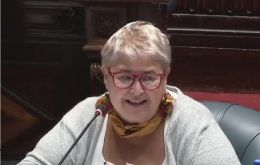
Authorities in Montevideo admitted Monday that bringing back the body of 39-year-old Rodolfo Álvarez, the Uruguayan soldier killed in action while serving on the United Nations peacekeeping mission in the Democratic Republic of Congo (Monusco), will not take place before Thursday. Álvarez had a wife and two daughters aged 4 months and 4 years, respectively.
-
Friday, February 7th 2025 - 09:44 UTC
Future Human Rights Secretary will be the first trans woman within Uruguay's Executive

Uruguay's future Human Rights Secretary Collette Spinetti will be the first trans woman to hold a position in the South American country's Executive Branch. She is also the third trans woman to reach public office after Michelle Suárez, who became Uruguay's first trans senator in October 2017, and Alejandra da Rosa, who was elected mayor (governor) of Tacuarembó in 2020. All three stemmed from President-elect Yamandú Orsi's Broad Front (Frente Amplio - FA).
-
Friday, February 7th 2025 - 08:46 UTC
Relief for Uruguayan troops in Congo arranged
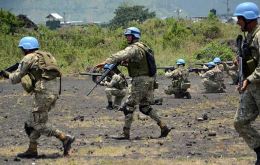
Uruguayan troops stationed in Congo as part of the United Nations Mission in the Democratic Republic of Congo (Monusco) are hoping to be relieved by Feb. 17, it was reported Thursday in Montevideo. Relatives of those still in Africa held telephone conversations with their loved ones on Thursday and confirmed the changeover date to local media.
-
Thursday, February 6th 2025 - 08:23 UTC
Uruguay's inflation reaches 1.1% in January

Uruguay's Consumer Price Index (CPI) went up 1.1% last month and 5.05% interannually, the National Institute of Statistics (INE) said in a report released Wednesday in Montevideo. Wednesday's figures represented a slight improvement for President Luis Lacalle Pou's administration after recording 1.53% in January 2024 for a 5.09% yoy.
-
Wednesday, February 5th 2025 - 09:01 UTC
Orsi evaluating candidates for Buenos Aires Embassy
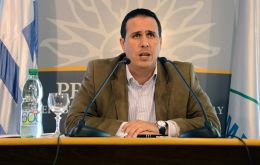
Uruguay's future government to be inaugurated on March 1 is evaluating candidates for the Embassy in Buenos Aires. According to local media, former Assistant Presidential Secretary Diego Cánepa seems to be the leading candidate to fill the vacancy left by Carlos Enciso, who resigned to focus on his possible candidacy for the Florida City Council. Foreign Minister Omar Paganini confirmed the position would remain unfilled until the change of government.
-
Tuesday, February 4th 2025 - 19:38 UTC
Uruguay's exports post 6% yoy increase

Uruguay's exports last month totaled U$S 912 million, according to a report released earlier this week in Montevideo by the Uruguay XXI Institute. Beef, cellulose, dairy products, and rice were the main items behind this achievement representing a 6% yoy increase.
-
Tuesday, February 4th 2025 - 10:02 UTC
Boric meets in Montevideo with Lacalle Pou, Orsi, Mujica, and Topolansky

Chilean President Gabriel Boric Font landed in Montevideo Monday in what is his first visit to Uruguay since taking office. He held meetings with like-minded President-elect Yamandú Orsi and former head of State José Pepe Mujica, among other local leaders to discuss how to further strengthen regional integration.
-
Tuesday, February 4th 2025 - 05:24 UTC
G7 members condemn Rwanda backed offensive in East Congo and attack on UN peacekeeping effort
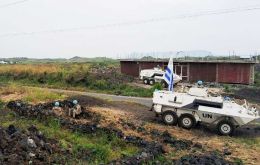
Seven foreign ministers gave a statement condemning the Rwanda-backed M23 offensive in eastern Democratic Republic of the Congo and the capture of Minova, Saké and Goma, endangering civilians and attacking UN peace keeping forces. Uruguayan forces, which are part of the UN peace keeping efforts, have suffered several casualties.
-
Monday, February 3rd 2025 - 20:07 UTC
Orsi not moving to Presidential residency post inauguration
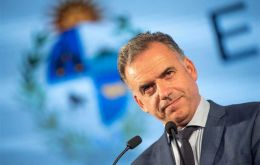
Uruguay's President-elect Yamandú Orsi announced that he will not be occupying the Suárez y Reyes Residence after taking office on March 1 but would rather stay at his current domicile in Salinas. “With my family, we already solved some things, like staying there in Salinas. My children are moving on to another stage,” he added regarding their attending high school.
-
Friday, January 31st 2025 - 09:47 UTC
Autopart makers Yazaki leaving Uruguay

Japanese autopart makers Yazaki announced the closure of its two plants in Uruguay citing rising costs, leaving thousands jobless, it was reported in Montevideo. Some 1,200 workers have been affected by the measure. The plants in Las Piedras and Colonia, which had been operating since 2007, represented 300 and 900 jobs respectively. Yazaki's presence in the region will be shifting to Argentina and Paraguay.
